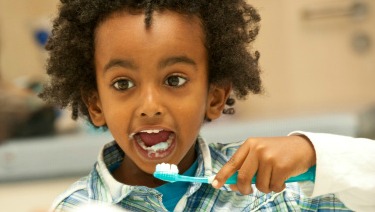
Caring for Little Smiles: A Comprehensive Guide to Pediatric Dental Health
Ensuring optimal dental health in childhood sets the foundation for a lifetime of healthy smiles. In this guide, we explore key aspects of pediatric dental health, offering insights and practical tips to help parents navigate the dental well-being of their little ones.
Early Start: The Importance of Pediatric Dental Care
Pediatric dental care should commence early in a child’s life. The American Academy of Pediatrics recommends the first dental visit by the age of one or within six months of the eruption of the first tooth. Early interventions and establishing a positive relationship with the dentist contribute to a lifetime of good oral health habits.
Building Healthy Habits: Daily Dental Care for Kids
Teaching children proper dental care habits is fundamental. Encourage regular brushing with a fluoride toothpaste and supervise until the child can effectively manage on their own. Introduce flossing as soon as there are adjacent teeth to ensure the removal of plaque between teeth, promoting optimal gum health.
Balanced Nutrition: A Key Player in Dental Health
Nutrition plays a pivotal role in pediatric dental health. Limiting sugary snacks and beverages helps prevent tooth decay. A diet rich in fruits, vegetables, and dairy products provides essential nutrients for strong teeth and gums. Adequate hydration also contributes to a healthy oral environment.
Fluoride: A Shield for Young Teeth
Fluoride is a crucial element in preventing tooth decay. Many communities have fluoridated water, and fluoride toothpaste is recommended for children. Consult the dentist to assess whether additional fluoride supplements are necessary based on the child’s individual dental health needs.
Regular Dental Check-ups: Monitoring Development
Routine dental check-ups are vital for monitoring the development of a child’s oral health. Dentists can identify potential issues early and provide guidance on preventive measures. Regular check-ups also help children become familiar and comfortable with dental visits, reducing anxiety in the long run.
Orthodontic Assessments: Timely Intervention
Orthodontic assessments should be a part of pediatric dental care. Early identification of orthodontic issues allows for timely intervention. The American Association of Orthodontists recommends an initial orthodontic evaluation by age seven to assess potential alignment and bite issues.
Preventing Dental Emergencies: Childproofing the Environment
Childproofing the environment is crucial to preventing dental emergencies. Ensure a safe home environment, use appropriate car seats, and discourage behaviors that may lead to dental injuries. Being proactive in childproofing can significantly reduce the risk of accidents impacting oral health.
Teaching Oral Hygiene: Turning It Into a Fun Routine
Transforming oral hygiene into a fun routine encourages children to actively participate in their dental care. Use child-friendly toothbrushes, sing songs while brushing, and consider interactive apps that make oral care enjoyable. Positive experiences foster a lifelong commitment to oral health.
Educational Resources for Parents: Staying Informed
Parents play a pivotal role in pediatric dental health. Staying informed about proper dental care, nutritional choices, and age-appropriate oral hygiene practices empowers parents to guide their children effectively. Educational resources provided by dental professionals contribute to informed decision-making.
Pediatric Dental Health: A Lifelong Investment
Investing in pediatric dental health is an investment in a child’s overall well-being. By prioritizing early dental care, instilling healthy habits, and fostering positive attitudes toward oral health, parents contribute to the foundation of a lifetime of healthy smiles. Explore Pediatric Dental Health for more insights and resources on nurturing your child’s dental well-being.